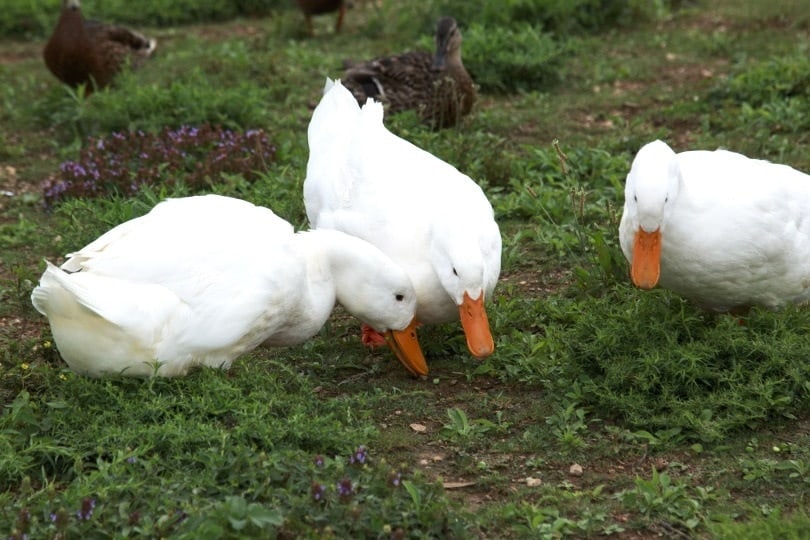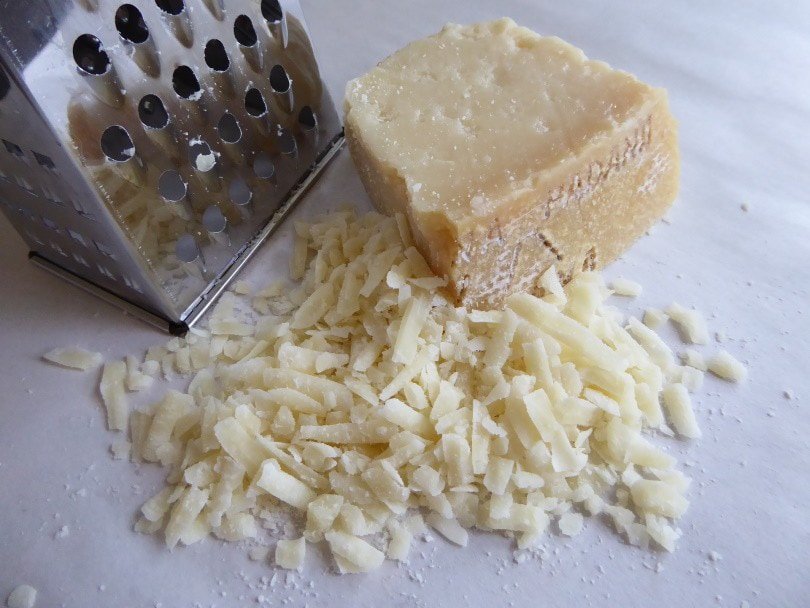The majority of a duck’s daily diet should consist of commercial duck or waterfowl food. But like humans, ducks enjoy treats now and then such as vegetable trimmings, cracked corn, and worms. Ducks can eat cheese as long as you shred it, for easy consumption.
It’s important to remember that ducks don’t have teeth and they don’t chew. Ducks swallow food whole which means you have to offer them food that’s small enough for them to swallow without causing them to choke. For this reason, always shred cheese before giving it to your ducks instead of offering them large chunks.
You can feed any type of shredded cheese to ducks as well as cottage cheese, which is very easy for ducks to swallow. It’s important to know that feeding any type of dairy food to ducks, including cheese, can result in their poop becoming stinkier!

The Eating Habits of Ducks
Ducks are omnivorous waterfowl that are avid browsers and foragers. They tend to chomp on anything they find interesting. When mature, ducks consume approximately 7 ounces of food daily.
When raising ducks, it’s necessary to provide them with proper nutrition & management. To protect your ducks from predators and keep them healthy, they should be maintained in a safe enclosure and fed high-quality duck feed.
When you provide your ducks with good feed and healthy treats like vegetable shreddings/peelings and cheese, you’ll have happy and healthy ducks!

How to Feed Ducks Cheese
You can place some shredded cheese in a dish for your ducks to enjoy. Shredded cheese and cottage cheese can also be mixed with chopped vegetables or fruits. Ducks can also be fed shredded cheese by hand. Hand feeding is a good way to bond with your ducks and keep them social.
When it comes to offering a treat like cheese to your ducks, don’t overdo it. To play it safe, don’t give a duck more than 1 ounce of cheese per day.
What’s in Cheese That’s Good for Ducks
Cheese contains vitamins, minerals, and proteins like calcium, vitamin A, D, and K, zinc, and magnesium that all promote bone health in ducks. Calcium and vitamin D are essential nutrients for strong bone development. When your ducks have strong, healthy bones, they’ll be less prone to physical deformities and bone fractures.
- Related read: 8 Small Duck Breeds to Own (With Pictures)
Cheese Is a Top Dietary Source of Calcium
As the most abundant mineral found in ducks’ bodies, calcium is important for keeping your ducks healthy. Calcium regulates nerve transmission, vascular & muscular function, and hormone secretion.
Calcium also plays a key role in egg production. If a duck’s diet is lacking in calcium, the quality of its eggshells is compromised. Ducks that produce eggs with soft shells are often missing calcium in their diets.

Cheese Is Rich in Dietary Protein
The individual amino acids contained in dietary proteins are necessary for your ducks’ diet for many reasons. These essential amino acids help build a strong immune system and promote the healthy growth of dense feathers. When ducks don’t get enough amino acids, they can become sick, retain fluid, and produce thin, weak feathers.
Since a body (including a duck’s body) cannot store dietary protein, it’s necessary to consume food rich in protein. A good way to ensure your ducks get the protein they need is to include cheese in their daily food intake.

Types of Cheese to Feed Ducks
Shredded goat cheese that’s prepared from goat milk is a good type of cheese to feed ducks. Goat cheese contains less fat than cheese made with cow milk and it’s completely safe for ducks to eat.
Shredded mozzarella cheese is easy for ducks to eat and less acidic when it comes already shredded. As mentioned earlier cottage cheese is a great option for ducks because it’s very soft and in the form of lumpy mush that they love. You can feed ducks all types of cheese you can find at your local grocery store. Stick with natural, non-flavored cheeses and steer clear of anything spicy or filled with potentially harmful chemicals.
Conclusion
As you can see, it’s perfectly OK for ducks to eat cheese. Just don’t overdo it when feeding cheese to ducks. Furthermore, you should always aim to balance your ducks’ diet. Cheese can certainly be a part of a varied diet, but offer it in moderation as too much can be detrimental to your feathered friends’ well-being.
Featured Image Credit: Joachim Süß, Pixabay
